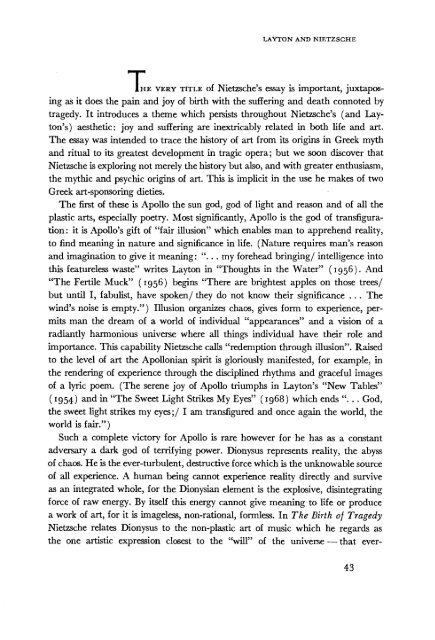LAYTON AND NIETZSCHE
LAYTON AND NIETZSCHE
LAYTON AND NIETZSCHE
You also want an ePaper? Increase the reach of your titles
YUMPU automatically turns print PDFs into web optimized ePapers that Google loves.
<strong>LAYTON</strong> <strong>AND</strong> <strong>NIETZSCHE</strong><br />
IHE VERY TITLE of Nietzsche's essay is important, juxtaposing<br />
as it does the pain<br />
Τ1н]<br />
and joy of birth with the suffering and death connoted by<br />
tragedy. It introduces a theme which persists throughout Nietzsche's (and Layton's)<br />
aesthetic: joy and suffering are inextricably related in both life and art.<br />
The essay was intended to trace the history of art from its origins in Greek myth<br />
and ritual to its greatest development in tragic opera; but we soon discover that<br />
Nietzsche is exploring not merely the history but also, and with greater enthusiasm,<br />
the mythic and psychic origins of art. This is implicit in the use he makes of two<br />
Greek art-sponsoring dieties.<br />
The first of these is Apollo the sun god, god of light and reason and of all the<br />
plastic arts, especially poetry. Most significantly, Apollo is the god of transfiguration<br />
: it is Apollo's gift of "fair illusion" which enables man to apprehend reality,<br />
to find meaning in nature and significance in life. (Nature requires man's reason<br />
and imagination to give it meaning: "... my forehead bringing/ intelligence into<br />
this featureless waste" writes Layton in "Thoughts in the Water" (1956). And<br />
"The Fertile Muck" (1956) begins "There are brightest apples on those trees/<br />
but until I, fabulist, have spoken/ they do not know their significance . . . The<br />
wind's noise is empty.") Illusion organizes chaos, gives form to experience, permits<br />
man the dream of a world of individual "appearances" and a vision of a<br />
radiantly harmonious universe where all things individual have their role and<br />
importance. This capability Nietzsche calls "redemption through illusion". Raised<br />
to the level of art the Apollonian spirit is gloriously manifested, for example, in<br />
the rendering of experience through the disciplined rhythms and graceful images<br />
of a lyric poem. (The serene joy of Apollo triumphs in Layton's "New Tables"<br />
(1954) and in "The Sweet Light Strikes My Eyes" (1968) which ends ". . . God,<br />
the sweet light strikes my eyes;/ I am transfigured and once again the world, the<br />
world is fair." )<br />
Such a complete victory for Apollo is rare however for he has as a constant<br />
adversary a dark god of terrifying power. Dionysus represents reality, the abyss<br />
of chaos. He is the ever-turbulent, destructive force which is the unknowable source<br />
of all experience. A human being cannot experience reality directly and survive<br />
as an integrated whole, for the Dionysian element is the explosive, disintegrating<br />
force of raw energy. By itself this energy cannot give meaning to life or produce<br />
a work of art, for it is imageless, non-rational, formless. In The Birth of Tragedy<br />
Nietzsche relates Dionysus to the non-plastic art of music which he regards as<br />
the one artistic expression closest to the "will" of the universe — that ever-<br />
43

















